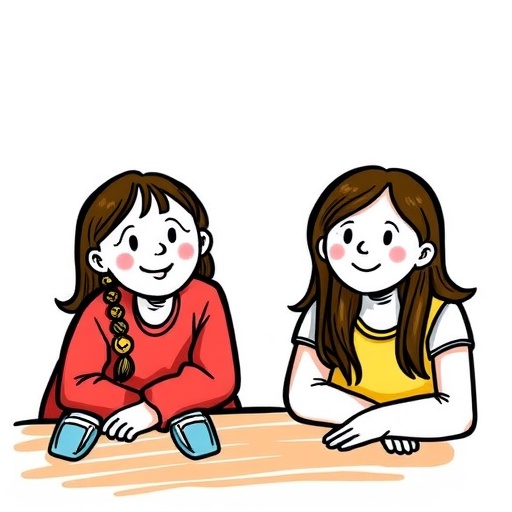In recent years, the intricate relationship between gifted education and the broader school culture has drawn increasing attention from educational psychologists and policymakers alike. A pioneering study published in BMC Psychology delves deeply into this dynamic, exploring how personality traits serve as crucial mediators in shaping both the culture within schools and the perceptions educators hold towards gifted education. As the educational landscape evolves, understanding these interrelations becomes pivotal for fostering an environment where gifted learners can thrive while harmonizing with the overall school ethos.
Gifted education, aimed at nurturing students demonstrating exceptional intellectual abilities, presents a unique challenge for schools. Integrating specialized curricula and pedagogical approaches within diverse school cultures requires more than logistical adjustments; it demands a nuanced understanding of the human elements influencing adoption and success. This study illuminates the often-overlooked role that teachers’ personalities play when evaluating and embracing gifted education programs, thus bridging the gap between structural offerings and cultural acceptance.
The research team used a comprehensive psychometric framework to parse out distinct personality traits and their influence on the school culture and educators’ attitudes. The mediational role of personality was analyzed to determine how intrinsic individual characteristics affect collective school values and behaviors, especially in the context of gifted education. These findings underscore the complex interplay between personal attributes and organizational culture, highlighting the necessity of personalized approaches in the implementation of specialized educational programs.
An intriguing facet of this study lies in its holistic approach, combining quantitative data with qualitative insights to construct a multifaceted picture of school environments. The researchers collected extensive survey data from a diverse demographic of educators, spanning various educational levels and institutional types. This broad sampling allowed for a robust analysis that transcends stereotypes or generalized assumptions about gifted education and personality dynamics.
One key insight revealed by the study is that openness to experience—a fundamental personality trait—significantly influences teachers’ receptiveness to gifted education initiatives. Educators who score high on this trait tend to champion innovative practices and view gifted education not as an isolated program but as an integral component of the school’s cultural fabric. This openness facilitates collaboration, enriches curricular diversification, and fosters a climate of inclusivity for gifted learners.
Conversely, traits such as neuroticism presented nuanced effects on school culture and attitudes towards gifted education. While excessive emotional instability could hinder adaptability and acceptance, moderate levels of conscientiousness and agreeableness seemed to promote positive engagement with gifted education. These findings suggest that personalized support and professional development targeting personality-driven challenges may optimize educators’ integration of gifted education programs.
Moreover, the study highlights that school culture itself is a dynamic construct influenced by the collective personalities within the institution. A school culture that embraces flexibility, creativity, and inclusiveness is more inclined to successfully incorporate gifted education. This synergy between individual educator traits and the overarching cultural environment creates fertile ground for tailored learning experiences that cater to diverse student needs.
Importantly, these conclusions carry substantial implications for educational leaders and policymakers. Recognizing the role of personality in steering school culture and curriculum acceptance suggests that recruitment, training, and ongoing support for educators should incorporate psychological assessments and interventions. Cultivating a school culture receptive to gifted education requires strategic alignment of human capital development alongside structural adaptations.
The mediating role of personality traits also shines a light on the social dynamics within schools. Teachers harboring contrasting personality profiles may experience varying degrees of conflict or cohesion when implementing gifted education initiatives. Understanding these interactions allows for proactive measures to mitigate resistance and promote collaborative problem-solving, ultimately enhancing the educational outcomes for gifted students.
From an applied perspective, school administrators can leverage these insights by fostering professional communities of practice that reflect diverse personality compositions, thereby balancing innovation and stability. Encouraging reflective practice and emotional intelligence development is equally vital to harmonize personal perspectives with organizational goals, particularly when navigating the complexities of gifted education inclusion.
The researchers propose that future efforts should not only focus on programmatic changes but also on enriching the social and emotional ecosystem within schools. By doing so, gifted education transcends a mere curricular addition, evolving into a catalyst for transforming school culture itself. Such an evolution has the potential to impact not only gifted learners but the student body as a whole, promoting academic excellence and emotional well-being.
This study’s rigorous methodology and comprehensive analysis set a benchmark for ongoing research in educational psychology. Its insights beckon a paradigm shift where personality-informed strategies become central to educational innovation and effectiveness. The fusion of gifted education with positive school culture mediated by personality offers a promising avenue for creating adaptive and inclusive learning communities.
In conclusion, bridging gifted education and school culture via the mediating role of personality presents an exciting and vital direction for future educational research and practice. This integrative perspective compels educators, administrators, and policymakers to rethink how educational programs are embedded within schools, emphasizing human factors as much as structural elements. The ripple effects of this approach could redefine educational equity, excellence, and innovation for years to come.
Subject of Research: The interrelation between gifted education, school culture, and the mediating role of personality traits in shaping teachers’ opinions and cultural integration of gifted education.
Article Title: Bridging gifted education and school culture: the mediating role of personality in shaping school culture and teachers’ opinions towards gifted education.
Article References:
Eva, N., Hutagalung, F.D., Zaid, S.M. et al. Bridging gifted education and school culture: the mediating role of personality in shaping school culture and teachers’ opinions towards gifted education.
BMC Psychol 13, 1104 (2025). https://doi.org/10.1186/s40359-025-03330-7
Image Credits: AI Generated




